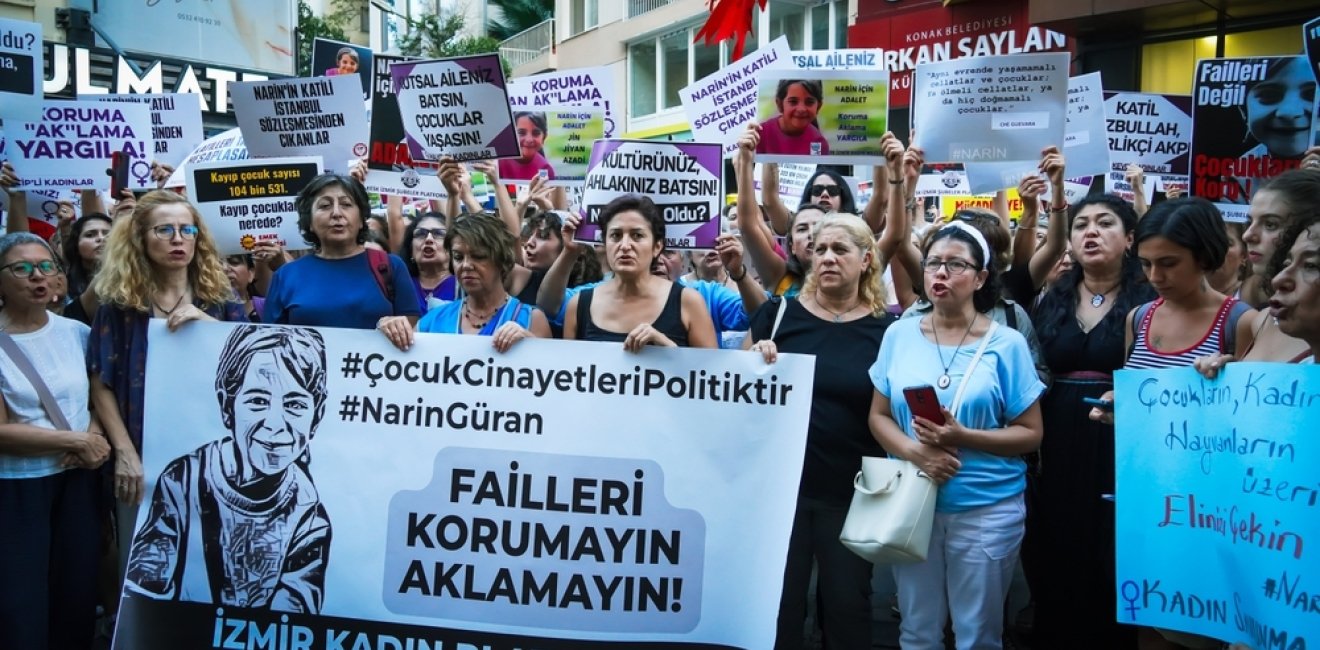The government pours more Islam onto society to resolve violence against women through the Directorate of Religious Affairs or the educational curriculum rather than tightening the legal framework.
Narin, an eight-year-old girl from a small village in Diyarbakır, went missing on August 21, 2024, on her way back from a Quran class at the village mosque. As the news of her disappearance spread, the entire country waited with fear and hope. Nineteen days later, her body was found on the banks of the village creek. While scattered evidence implicated her own family, including her mother and uncle, the authorities reportedly ran an ineffective investigation. Meanwhile, the MPs of the governing party defended the family, whom they embraced as long-time friends.
Since Narin’s body was discovered, 48 other women and girls, including a two-year-old baby girl, were killed in Turkey. Two were İkbal and Ayşenur, 19-year-old women living with their families in Istanbul. Semih Çelik, their schoolmate, beheaded both women, dismembered İkbal, and threw her head from Istanbul’s iconic Byzantine wall before he committed suicide. İkbal’s parents arrived at the scene looking for their daughter—only to find her body in pieces. The cruelty of İkbal and Ayşenur’s murders, along with constant news of violence, caused a massive uproar. Reactions on social media turned into protests on the street.
Ineffective legislation
Narin, İkbal, and Ayşenur were not the first nor last to be murdered. Hundreds of women are killed by men every year in the country. According to the We Will Stop Femicides Platform, a civil platform established in 2010 to fight femicide, in 2023, 417 women were killed in Turkey, and 248 were found suspiciously dead. In 2024, 320 women have been killed at the time of writing. Protestors and activists, mostly women, hold the authorities responsible for such crimes. Authorities fail to protect women despite constant requests or cut perpetrators slack in the courts. The government, activists claim, has been unwilling to reinforce existing laws, creating a sense of impunity for criminals. Violence against women and children is indeed political.
Existing legislation is well-designed to prevent such crimes—if enforced. In 2012, Turkey signed the Istanbul Convention, an international agreement within the frame of the European Council to prevent violence against women and domestic violence. Turkey also passed Article 6284, a bill to prevent violence against women and protect women, children, and other family members from physical, psychological, economic, and sexual violence.
However, Turkish authorities proved reluctant to enforce the law. Since 2012, hundreds of women have been killed by their partners or other family members. Many were seeking protection from authorities after submitting several complaints to the police. Authorities’ reluctance is partly cultural. However, the ruling party, the AKP, did not attempt to address the cultural components to prevent crimes against women and children. Instead, the party and its leader, Tayyip Erdoğan, not only failed to resolve the problem but exacerbated it in various ways. Erdoğan’s ideology and political concessions to different groups to stay in power played a crucial role in this process.
Islamization as the AKP solution
For one, Erdoğan resorted to Islamization to resolve the issue. The party’s conservative outlook has served to empower patriarchal mindsets that dominate the country. Discursively, Erdoğan tends to blame victims for the violence they endure. For instance, when Münevver Karabulut was killed by her wealthy boyfriend in 2010, Erdoğan blamed Münevver and her parents for not keeping an eye on their daughter. Erdoğan sustained his attacks on women activists, too. During an environmental protest in 2011, a female activist was severely injured by the police. Erdoğan reacted by shaming the female activist and questioning if she was a virgin or not.
For Erdoğan’s government, women’s rights are secondary to the sanctity of family. According to Erdoğan, women are only worthy because they are mothers, their recognized role in his interpretation of Islam. He also believes women need not ask for equality, as men and women are not and can never be equal by natural creation. When it comes to violence against women, Erdoğan, again, hides behind Islam to argue that a true Muslim would not hurt women. That is why the government forces more Islam onto society to resolve violence against women through the Directorate of Religious Affairs or the educational curriculum rather than tightening the legal framework.
This conservative Islamic outlook did not just weaken legal enforcement; it also triggered other legal hurdles. Empowered by Erdoğan’s discourse, several Islamic groups fought the Istanbul Convention and Article 6284, which, in their view, sought a sexless society, destroyed the family, and victimized male perpetrators of domestic violence by separating them from their families. (They also filed a court case against the We Will Stop Femicides Platform, pleading for its closure due to immoral and illegal activity. However, the court rejected the case). Islamists’ lobbying efforts convinced already reluctant Erdoğan to withdraw Turkey from the Istanbul Convention in 2021. In exchange for a few thousand votes, he sent a strong political message that the ruling party was not serious about ending violence against women. Now, law enforcement has even fewer incentives to follow through with the already half-heartedly enforced law.
Weakened institutions & protections
Erdoğan’s political concessions to his junior coalition partners also resulted in relaxed state oversight over the incarceration system. In 2020, amidst the pandemic, Erdoğan agreed to extend special amnesty to more than 100,000 convicted felons (except political prisoners, including members of terrorist organizations, sex offenders, drug traffickers, and murderers). Three years later, the AKP government again amended the law on criminal execution. Per the recent changes, all felons (except for political prisoners and members of terrorist organizations) convicted of murder, assault, sexual offenses, robbery, embezzlement, and drug trafficking, among other charges, had their sentences substantially reduced and parole rights expanded. Many were transferred to open-air prison systems and enjoyed a greater presence in society and opportunities to recommit crimes. These changes incentivized criminal activity instead of deterring it.
Moreover, the sheer incompetence of Erdoğan’s government opened opportunities for criminals. Hackers stole the personal information of millions of Turkish citizens during the COVID-19 pandemic, and their clients used it to blackmail and sexually harass young girls and women. Journalists, activists, and lawyers also reported that these hackers sold women’s personal information to their exes and stalkers, who then could easily track them down. The authorities have taken no action despite insistent calls, and women were reportedly discouraged from filing complaints by police officers.
Erdoğan blamed digital platforms, deviant networks, drugs and alcohol, and TV shows for the most recent wave of criminal violence. He added that the gaps in the criminal execution and incarceration system might have played a role, too. He did not mention, though, that his government withdrew from the Istanbul Convention and failed to protect Turkish citizens’ privacy. Nor did he admit that, with his coalition partners, they passed several rounds of amnesty for convicts, effectively creating impunity and incentivizing violence.
Erdoğan’s government holds no red lines regarding actions it is willing to take to stay in power, including the gutting of the criminal justice system and creating substantial impunity for felons. When it comes to resolving the issue of spiraling violence, he can only envision two tools: banning social media platforms and expanding Islamic messaging in schools, media, and everyday life to keep citizens on the right path. Neither tool is effective, as the intensifying violence in the country attests. Women and children, the most vulnerable members of Turkish society, are bearing the brunt of his politics.
Şebnem Gümüşçü is an associate professor of political science at Middlebury College.
The views represented in this piece are those of the author and do not express the official position of the Wilson Center.








